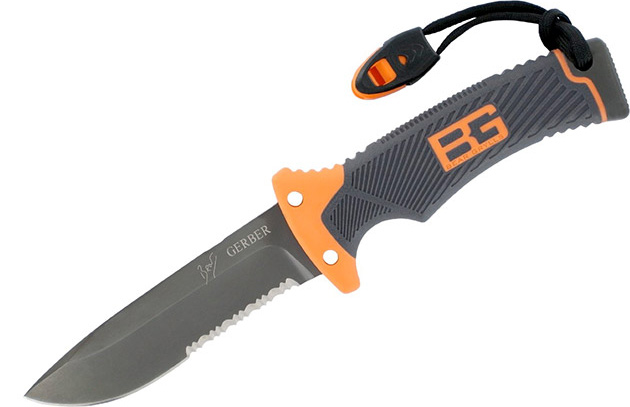Ok, so actually the knives are just a sub-level of the real focus of this post, an item that is arguably the most common mark of a prepper, the bug out bag. Say what?! A what bag? Bug Out. It is also known as the GTFO bag, the GOOD (Get Out Of Dodge) bag, PERK (Personal Emergency Relocation Kit), and the 72-hr bag, and that is exactly what it is supposed to be, a bag that holds everything you would need to survive for at least 72 hours completely alone, in any environment. Serious preppers have many bug out bags, usually one main one, several smaller ones that are everywhere from the workplace or school or car, and a more heavily stocked INCH (I'm Never Coming Home) bag. I will not take the time to go through what should be in a good bug out bag, because while everyone agrees on the basics, everyone has their own little variations. Several links will be at the end of this post if anyone is interested. I recently decided to start working on a bug out bag, and if anyone else decides to start or wants help, please say so in the comments, I would love to know. (And lets face it, everyone should be interested!)
Alrighty then, lets move onto the sharp objects. I do not claim to be any sort of expert on knives at all. I'm sure you all know someone who knows what they are talking about when it comes to knives, so ask them if you have questions. If you don't, ask me and I can try to steer you in the right direction. (Like how I write as if tons of people read my blog?) First of all, when I said sharp objects, I meant it. When it comes to knives, there are few things more dangerous than a dull blade. Why? People are generally afraid of sharp blades; that's good, they will be more careful with them. Dull blades lead to injuries. With a dull knife, you tend to push down harder to cut, often forcing the knife in a direction not intended. Also, rather than cut, dull knives can gouge, which can often cause more damage. In a survival situation, a paper cut could mean death. There are no antibiotics if it gets infected, and no help for you if you get sick from the infection. The cut itself may not kill you, but sickness can lead to bad decisions, and in a survival situation, its all about decisions. Anywhoos, back to knives. Why are knives so important? Here are just a handful of reasons off the top of my head. (in no particular order after number one)
1. A knife cannot be made from scratch in a survival situation.
2. The ability to immediately self-defend and the ability to construct better weapons.
3. The ability to quickly sharpen almost any stick for hunting or defense.
4. The ability to gather wood more quickly, and even split small logs.
5. The ability to cut vines or hides into cords.
6. The ability to make small traps or snares.
7. The ability to cut meat, whether for eating or jerky.
8. The ability to start a fire by making sparks with certain rocks.
As you can see, a knife is very useful in a survival situation, whether in the middle of nowhere or the middle of the city. Picking the ideal knife is a chore. Most professional survivalists will actually suggest several knives, a larger fixed blade knife and a smaller folding knife. I wont take the time to discuss all different types of knives, but again, I will include a link below.
Food for thought: What is the one thing Bear Grylls (Man vs Wild) and Les Stroud (Survivorman) always take with them to the locations where they are learning to survive? A knife. (Also, Bear Grylls actually has a line of knives through Gerber that are worth checking out.)
Links:
Bug out bag- http://www.thesurvivalistblog.net/bug-out-bag/
http://www.bugoutsurvival.com/2008/08/sample-bug-out-bag-checklist.html
Also you can just Google "bug out bag checklist"
Knives-http://survivalcache.com/survival-knife/
http://stealthsurvival.blogspot.com/2009/01/types-of-knives-and-their-use.html
I'll end this post as I did last week. Some may think preppers are crazy. We hope we are crazy and that we spent time and money on empty worries. But if not, we will be prepared.

Don't forget that if you are applying a greater force, the knife is more likely to break. A dull knife also takes up space and if you don't know that it is dull, you may mistakenly take the chance to rely on it. Any and every knife must be taken care of. As for supply bags, emergency rations can be helpful, but make sure you know what you have. If you only have lean meet jerky, you can get protein poisoning (yes, to much of any good thing can become a problem and protein poisoning does exist and can be a serious risk) or if all of your food is freeze dried, you may run out of water. Variety is key with a supply bag. Also take anything that has multiple uses (fishing line, duct tape, needles, etc.) and pack it in the supply bag. Sometimes your life can rely on finding a small enough piece of string or sealing a leak in the rain to prevent hypothermia.
ReplyDeleteI agree completely. Thanks for commenting as well, it adds to the discussion, and I'm glad to see some one else who interested in such matters. Do you have a bug out bag yourself?
Delete